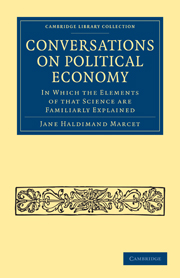Book contents
- Frontmatter
- PREFACE
- Contents
- CONVERSATION I INTRODUCTION
- CONVERSATION II INTRODUCTION—continued
- CONVERSATION III ON PROPERTY
- CONVERSATION IV PROPERTY—continued
- CONVERSATION V ON THE DIVISION OF LABOUR
- CONVERSATION VI ON CAPITAL
- CONVERSATION VII CAPITAL—continued
- CONVERSATION VIII ON WAGES AND POPULATION
- CONVERSATION IX WAGES AND POPULATION—continued
- CONVERSATION X ON THE CONDITION OF THE POOR
- CONVERSATION XI ON REVENUE
- CONVERSATION XII REVENUE FROM LANDED PROPERTY
- CONVERSATION XIII REVENUE FROM THE CULTIVATION OF LAND
- CONVERSATION XIV REVENUE FROM CAPITAL LENT
- CONVERSATION XV ON VALUE AND PRICE
- CONVERSATION XVI ON MONEY
- CONVERSATION XVII MONEY—continued
- CONVERSATION XVIII COMMERCE
- CONVERSATION XIX ON FOREIGN TRADE
- CONVERSATION XX FOREIGN TRADE—cont.
- CONVERSATION XXI ON EXPENDITURE
- INDEX
CONVERSATION XIV - REVENUE FROM CAPITAL LENT
Published online by Cambridge University Press: 07 September 2011
- Frontmatter
- PREFACE
- Contents
- CONVERSATION I INTRODUCTION
- CONVERSATION II INTRODUCTION—continued
- CONVERSATION III ON PROPERTY
- CONVERSATION IV PROPERTY—continued
- CONVERSATION V ON THE DIVISION OF LABOUR
- CONVERSATION VI ON CAPITAL
- CONVERSATION VII CAPITAL—continued
- CONVERSATION VIII ON WAGES AND POPULATION
- CONVERSATION IX WAGES AND POPULATION—continued
- CONVERSATION X ON THE CONDITION OF THE POOR
- CONVERSATION XI ON REVENUE
- CONVERSATION XII REVENUE FROM LANDED PROPERTY
- CONVERSATION XIII REVENUE FROM THE CULTIVATION OF LAND
- CONVERSATION XIV REVENUE FROM CAPITAL LENT
- CONVERSATION XV ON VALUE AND PRICE
- CONVERSATION XVI ON MONEY
- CONVERSATION XVII MONEY—continued
- CONVERSATION XVIII COMMERCE
- CONVERSATION XIX ON FOREIGN TRADE
- CONVERSATION XX FOREIGN TRADE—cont.
- CONVERSATION XXI ON EXPENDITURE
- INDEX
Summary
CAROLINE
I THINK I now understand very well how an income is derived from agriculture and manufactures; and also how it is produced by trade; but there are many men of property who follow none of these occupations; how, therefore, can their capital yield an income?
MRS. B
When a man possesses a very large property, he frequently will not be at the trouble of employing it himself; but will engage some other person to do it for him. You have seen that a landed proprietor who does not farm his own estate derives a revenue from the farmer in the form of rent.
CAROLINE
But I allude to men of fortune without landed property, who live upon their income, although their capital is not employed.
MRS. B
Reflect a moment, and you will be convinced that no capital can yield an income without being employed. If, therefore, the owner does not invest it in some branch of industry himself, another person must do it for him. A capitalist under such circumstances may be supposed to say, “I am possessed of an ample stock of subsistence for labourers, and of materials for workmanship, but I will engage some other person to take charge of so troublesome an undertaking as that of setting the people to work, and collecting the profits derived from their labours.”
- Type
- Chapter
- Information
- Conversations on Political EconomyIn Which the Elements of that Science are Familiarly Explained, pp. 245 - 268Publisher: Cambridge University PressPrint publication year: 2010First published in: 1816



